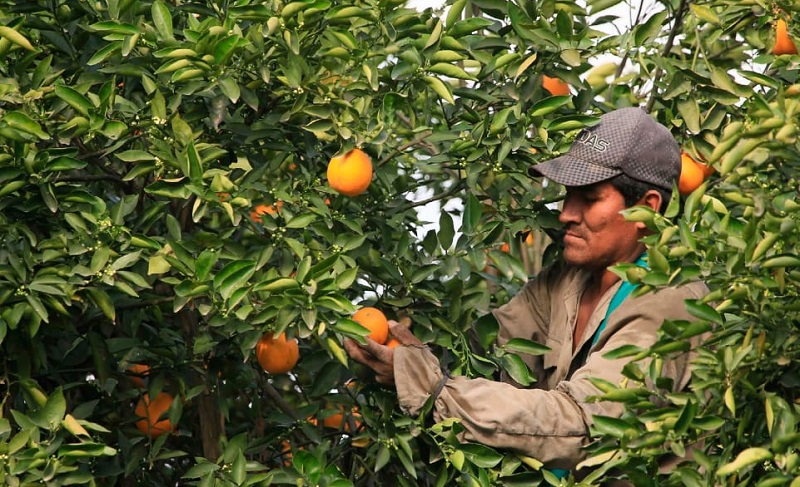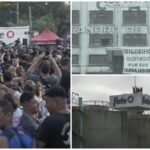
Julio Cesar Centeno, 49 years old, known in Barrio San Francisco de Libertador as “Penano” or “Brujo”, worked in the orange and lemon harvest, hired by the outsourced company Manpower, which hires harvest workers to perform tasks on Ledesma farms. SAAI. The day before yesterday, March 13, while harvesting lemons at the Paradiso farm, he suffered a decompensation after being exposed to very high temperatures. That day in Libertador General San Martín the thermal sensation exceeded 40 degrees Celsius.
“Penano” was found decompensated by his colleagues, who demanded urgent medical attention. The ambulance took more than an hour to reach the farm, which is located in the mountains miles from the town. Although the health personnel tried to revive him, raising his legs and applying injectables and serum, he had to be transferred to the Oscar Orías regional hospital, where he died of septic shock, according to the medical report.
It is the company’s usual practice to have outdoor harvest work days between 10 a.m. and 6 p.m., with the sole reason that the fruit being harvested is dry for export and is not damaged. However, as different rural workers told La Izquierda Diario, at the beginning of the season the lemon harvest is being carried out in “bulk” for the production of juices and essential oil, so no special care is required and there was no need to expose workers to perform tasks during hours when sun and steam damage health more and make work more difficult. So much so, that the day after the decompensation, Thursday, March 14, the company called on the harvesters to enter at 6 a.m. in the morning, showing that it was unnecessary to expose workers to performing tasks at noon or in the afternoon.
The same day there were four other harvest workers unbalanced. In this first week of the orange and lemon harvest of the 2024 Ledesma SAAI season, the first worker death of the year occurs in the agro-industrial complex. The company did not stop crop production for a moment despite the fact that Centeno’s colleagues and the other unbalanced people were helping or worried about such a tragic situation. Nor does it guarantee ambulances or emergency medical assistance on each of the farms, with Ledesma SAAI reporting profits of $27,639 million.
The death of “Penano” cannot be separated from the working conditions of rural workers: A piecework in which they are only paid for the amount harvested or “so much”, and if they feel bad or get sick they are not paid. pay the day or are paid on a reduced basis. They work in the harvest for only 6 months a year, so they must make an extra effort to be able to make a difference, doing more than one daily wage task per day, without breaks, which often involves harvesting more than 500 kilos of lemons or oranges per day. day, a repetitive task of going down and up stairs carrying heavy backpacks, which causes illnesses and occupational accidents.

A large number of workers are outsourced by contracting companies such as Benefits-Manpower or Randstad-Trading, with fewer rights than the rest of their colleagues. All of the harvesters, both signed by Ledesma SAAI and by the outsourced companies, are not guaranteed dining room service, they have to take water and food, and have lunch outdoors and on the ground. Outsourced workers like “Penano” are not even properly guaranteed clothing, work shoes and safety elements, in addition to being paid less wages.
At the wake and burial of “Penano” dozens of citrus growers, sugar workers and neighbors came to accompany their families in this difficult moment. His colleagues from the recovered union UATRE section 877 also came to show solidarity. A sign that in hard times the friendship and working-class brotherhood of the rural citrus growers, the sugar growers and residents of the working-class and Guaraní neighborhoods such as San Francisco, 18 de Noviembre and Patricias Argentinas are also ratified.
The death of Julio “Penano” Centeno was not a fortuitous, casual or accidental event, it was an avoidable death. The companies, Ledesma SAAI and Manpower, are responsible for the health of the workers due to the unhealthy working conditions and the precariousness to which they are exposed.
A commission of family members, rural workers and supportive doctors should have the possibility of investigating and gaining greater knowledge of the facts to determine not only the corporate responsibility that is evident, but also the deficiencies in the health and work system to make changes. that are needed so that this NEVER happens AGAIN.
Given the fact, the recovered UATRE 877 Ledesma branch issued a statement with a list of claims that demand the presence of ambulances on each farm, the non-performance of work in the face of high temperatures, the payment of sick days and the signing by Ledesma of the outsourced, among other measures to improve working conditions. They end their statement by stating that “all these changes that we demand are necessary so that this never happens again, in defense of the life and health of rural workers.”
We support the demand that the working conditions of rural people change and put an end to precariousness and unhealthiness, as well as that all safety and preventive measures be taken, so that worker deaths do not happen again and that life on the farms does not stop. of the company.
Source: www.laizquierdadiario.com

